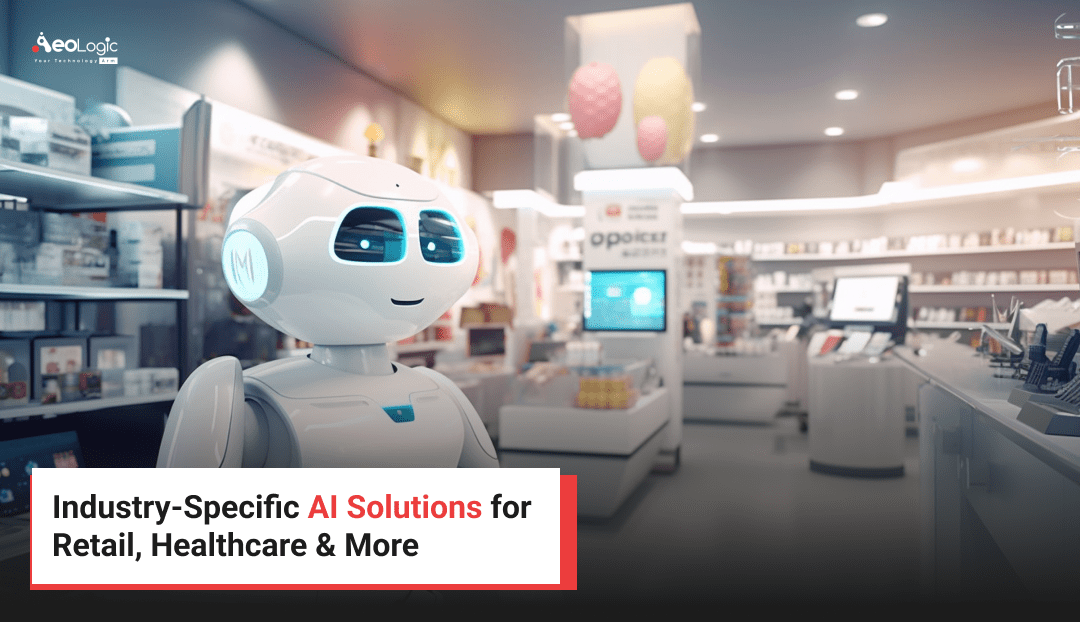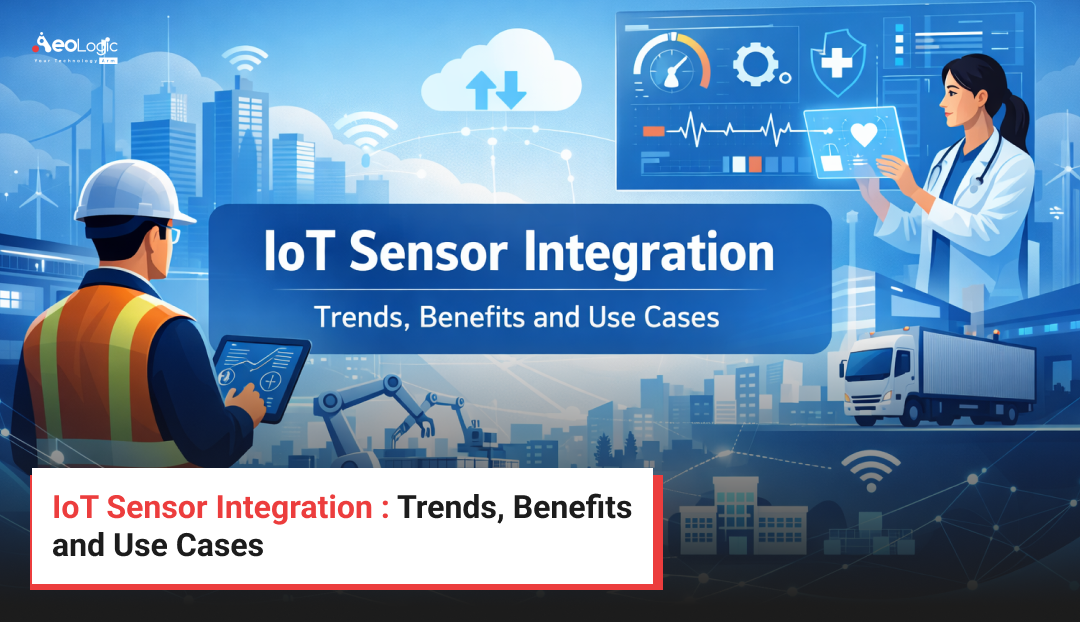Currently, AI solutions are popular worldwide because of their capability, potential, features, use cases, and many benefits. Every industry and business is investing in AI to make their businesses or industry advance in the digital transformation. This is necessary to ensure that AI provides stability, scalability, and a more long-term vision for operating businesses efficiently.
Industries that are not using or implementing the AI solutions are still lagging behind the others, and gradually, they will be on the brink of extinction. But the traditional AI solutions are also an aspect of worry that they are not capable of fulfilling the increasing expectations and demands of the industries.
To make this possible, some companies are implementing industry-specific AI solutions that are more focused and capable of making things better.
Tailored solutions are developed to meet the specific demands of different industries like healthcare, finance, agriculture, transportation, retail, and education. The advanced AI algorithms are capable of solving complex issues by understanding their patterns as they were specifically developed for those issues. They deal with how artificial intelligence-powered custom solutions are changing the fate of industries, including manufacturing, finance, transportation, healthcare, and science, by making digital twins, supply chain optimization, and predictive maintenance possible.
Read more: Steps to Choose Right AI Solutions Provider for Your Business
Key Statistics and Global Market Analysis
Here are some key statistics about the AI mentioned below.
- The global AI market is valued at over $600 billion.
- The AI industry is projected to increase in value by over 5x over the next 5 years.
- The US AI market is forecast to reach $299.64 billion by 2026.
- The AI market is expanding at a CAGR of 37.3% between 2022 and 2030.
- 83% of companies claim that AI is a top priority in their business plans.
- 48% of businesses use some form of AI to utilize big data effectively.
- 38% of medical providers use computers as part of their diagnosis.
- One survey found that 87% of global organizations believe that AI technologies will give them a competitive edge. This equates to an increase of 12% from the previous year.
What Are Industry-Specific AI Solutions for Various Industries?
Industry-specific AI solutions refer to the AI software solutions developed for specific operations in specific industries. Industry-specific AI solutions are developed purposely to fulfill the demands and problems that cannot be solved with the general or traditional AI solutions.
Specific AI solutions are enhancing various operations in various industries like providing more advanced diagnostics systems in healthcare, more personalization for retail shopping, predictive maintenance and supply chain optimization in manufacturing, soil quality analysis in agriculture, more enhancing learning experience in the education industry.
Also Read: How Custom AI Software Solutions Improve Business
Applications of Industry-Specific AI Solutions for Retail, Healthcare, and More
There are various applications of industry-specific AI solutions for retail, healthcare, and more. Here are a few mentioned below.
AI In Healthcare
AI in healthcare offers various benefits and applications for the benefit of patients as well as for healthcare organizations. The specific AI solutions can be used to diagnose patients with more accuracy than manual methods.
It can analyze patient conditions and analyze data to provide them personalized treatment plans, personalized medicines, diagnosis of possible risk factors, and can analyze medical images in seconds, reducing the burden of administration by automating various tasks. This overall enhances decision making, improves patient outcomes, increases productivity, and saves the lives of patients.
| Benefit | Using AI in Healthcare |
|---|---|
| Faster & Accurate Diagnoses | AI helps analyze medical data quickly and accurately, reducing diagnostic errors. |
| Personalized Treatment Plans | AI algorithms suggest customized treatment based on patient history and genetics. |
| Remote Patient Monitoring | AI-powered wearables and apps track vital signs and alert doctors in real time. |
| Operational Efficiency | Automates administrative tasks like billing, scheduling, and patient records. |
| Early Disease Detection | AI detects patterns in scans and reports to identify diseases in early stages. |
| Reduced Healthcare Costs | By improving efficiency and reducing errors, AI lowers overall treatment costs. |
| Enhanced Drug Development | AI accelerates drug discovery by predicting compound effectiveness faster. |
| Improved Patient Engagement | Chatbots and AI tools provide instant answers and reminders, boosting interaction. |
| Data-Driven Decisions | AI supports evidence-based decisions using large-scale patient data analysis. |
| Predictive Analytics for Care | Forecasts patient outcomes and readmission risks to improve care planning. |
AI In Finance
AI in finance also provides cost savings for banks and other financial organizations. The AI can analyze the financial data to identify the patterns of transactions to prevent any fraudulent activity. AI can also provide financial planning to help businesses remove the burden of finance.
The banking sector can also provide a more personalized experience to the customers in aspects like loans, savings, and investment options, etc which overall builds a good relationship with the customers. The AI-powered chatbots can solve the queries of customers that make them satisfied with the financial organizations.
| Benefit | Using AI In Finance |
|---|---|
| Fraud Detection & Prevention | AI can analyze transaction patterns in real-time to detect and prevent fraud. |
| Risk Assessment | AI models help evaluate credit risk and market volatility with high accuracy. |
| Automated Trading | AI algorithms can execute trades at optimal times, increasing profitability. |
| Personalized Financial Services | AI enables tailored recommendations for budgeting, investing, and saving. |
| Cost Reduction | Automating repetitive tasks like data entry and reporting lowers operational costs. |
| Regulatory Compliance | AI helps monitor and ensure compliance with financial regulations and laws. |
| Improved Decision-Making | Data-driven insights support faster and smarter financial decisions. |
| Customer Service Automation | AI chatbots and assistants handle queries efficiently, enhancing user experience. |
| Fraud Pattern Prediction | AI anticipates potential future fraud methods by analyzing historical data. |
| 24/7 Financial Monitoring | AI systems provide round-the-clock monitoring and alerts for any anomalies. |
AI In Retail
The retail industry is a fast-growing industry as it needs specific AI solutions to enhance its efficiency and operations. AI offers various benefits for the retail industry such as better inventory management, preventing unnecessary expenses, sustainability, better supply chain management, customer satisfaction etc. AI can provide a personalized experience to customers by analyzing their last interactions.
This also improves the supply chain management by managing inventory, as to which stock needs to be kept and which needs to be removed. The specific AI solutions can also make forecasts about the market demands and supply, which makes the retail industry stay ahead in the competition.
| Benefit | Description |
|---|---|
| Personalized Customer Experience | AI analyzes customer behavior and preferences to deliver tailored product recommendations and offers. |
| Inventory Management | AI helps retailers predict demand, optimize stock levels, and reduce overstock or out-of-stock issues. |
| Dynamic Pricing | AI-powered pricing tools adjust prices in real-time based on demand, competition, and buying trends. |
| Fraud Detection | AI monitors transactions and identifies suspicious activities to reduce fraud and theft in retail operations. |
| Customer Service Automation | Chatbots and virtual assistants provide instant support, reducing wait times and improving satisfaction. |
| Sales Forecasting | AI predicts future sales trends using historical data and market conditions, enabling better planning. |
| Visual Search and Recognition | Customers can search for products using images, enhancing the online shopping experience. |
| In-Store Experience Enhancement | AI enables smart shelves, digital mirrors, and personalized in-store navigation for better engagement. |
| Supply Chain Optimization | AI streamlines supply chain processes by predicting delays, optimizing routes, and improving delivery. |
| Customer Retention | AI helps identify at-risk customers and suggests retention strategies to improve loyalty and repeat sales. |
AI In Manufacturing
AI in manufacturing is proving to be a revolutionary thing as never before. The manufacturers have increased their efficiency, productivity, cut off the various costs, etc, with the specific AI solutions. The AI-powered algorithm can analyze the data to enable predictive maintenance for the equipment to avoid downtime.
It can also meet the demands and supply expectations by understanding the market trends, customers’ needs, etc. AI-powered automation automates repetitive tasks that make employees focus on more complex strategies and tasks.
| Benefit | Using AI in Manufacturing |
|---|---|
| Predictive Maintenance | AI predicts equipment failures before they occur, reducing downtime and repair costs. |
| Quality Control | AI systems can detect defects in real-time, ensuring consistent product quality. |
| Process Optimization | AI analyzes data to improve production workflows and reduce waste. |
| Supply Chain Management | AI enhances demand forecasting, inventory control, and delivery efficiency. |
| Energy Efficiency | AI tracks and optimizes energy usage, lowering operational costs. |
| Automation of Repetitive Tasks | Robots and AI systems handle repetitive tasks, improving speed and consistency. |
| Workplace Safety | AI monitors environments to detect hazards and ensure worker safety. |
| Cost Reduction | Efficient processes, reduced downtime, and optimized resource use lower costs. |
| Faster Decision-Making | AI provides real-time insights to support data-driven decisions. |
| Customization & Flexibility | AI enables mass customization by adjusting manufacturing parameters quickly. |
AI in Agriculture
The agriculture sector is the sector that feeds the world, so this is crucial to enhance this industry. The AI-powered algorithm can be used to analyze the soil quality, weather forecasting to sow the right crops. This right forecasting about the market helps farmers to sell their crops at the right price.
The farmers also get the right information and learning with the specific AI to enhance their farming operations. This overall helps global development as the agriculture industry is important for the whole globe.
| Benefit | Using AI in Agriculture |
|---|---|
| 1. Precision Farming | AI enables accurate monitoring of crops, soil, and weather to optimize inputs. |
| 2. Predictive Analytics | Helps forecast crop yields, weather patterns, and market trends for better planning. |
| 3. Automated Irrigation Systems | AI systems regulate water use based on soil moisture and crop needs, reducing waste. |
| 4. Pest & Disease Detection | AI-powered drones and image recognition tools detect issues early, minimizing losses. |
| 5. Efficient Crop Management | Machine learning analyzes crop health, growth stages, and recommends actions. |
| 6. Cost Reduction | Automation and data-driven insights lower the need for manual labor and inputs. |
| 7. Improved Supply Chain | AI helps forecast demand, optimize logistics, and reduce post-harvest losses. |
| 8. Soil Health Monitoring | Sensors and AI tools analyze nutrient levels, ensuring better soil management. |
| 9. Weather Forecast Integration | AI integrates real-time weather data for timely decisions in farming operations. |
| 10. Sustainable Farming | AI supports eco-friendly practices by reducing resource usage and improving yields. |
Cost of Industry-Specific AI Solutions for Specific Industries
The specific AI solutions’ costs vary industry by industry, with different factors also influencing the costs. The factors like industry type, number of operations to enhance, requirements, etc, can impact the costs. Here are the costs of AI solutions from different industries mentioned below.
Cost in Different Industries:
- Transportation & Logistics: $500,000 – $700,000+ (e.g., route optimization, autonomous vehicles).
- Telecommunications: $300,000 – $500,000+ (e.g., network optimization, customer service automation).
- Real Estate: $250,000 – $600,000+ (e.g., property valuation, demand forecasting).
- Education: $150,000 – $800,000+ (e.g., personalized learning platforms, student performance analysis).
- Healthcare: $20,000 – $50,000 (e.g., medical diagnosis, drug discovery).
- Fintech: $50,000 – $150,000 (e.g., fraud detection, algorithmic trading).
| Industry | Estimated Cost Range | Typical Use Cases |
|---|---|---|
| Transportation & Logistics | $500,000 – $700,000+ | Route optimization, autonomous vehicles, fleet management |
| Telecommunications | $300,000 – $500,000+ | Network optimization, predictive maintenance, customer service AI |
| Real Estate | $250,000 – $600,000+ | Property valuation, market trend prediction, demand forecasting |
| Education | $150,000 – $800,000+ | Personalized learning systems, student performance analysis |
| Healthcare | $20,000 – $50,000 | AI-assisted diagnosis, drug discovery, patient monitoring |
| Fintech | $50,000 – $150,000 | Fraud detection, credit scoring, algorithmic trading |
Cost Breakdown by AI Type:
- Basic AI Automation: $5,000 – $50,000 (e.g., chatbots, automated responses).
- Machine Learning Models: $20,000 – $200,000 (e.g., fraud detection, predictive analytics).
- Generative AI Models: $50,000 – $500,000 (e.g., AI content creation, image generation).
- Custom AI Solutions: $100,000 – $ 1 M+ (e.g., enterprise-grade AI systems).
| AI Type | Estimated Cost Range | Use Case Examples |
|---|---|---|
| Basic AI Automation | $5,000 – $50,000 | Chatbots, rule-based systems, automated emails |
| Machine Learning Models | $20,000 – $200,000 | Predictive analytics, fraud detection, demand forecasting |
| Generative AI Models | $50,000 – $500,000 | AI content generation, synthetic media, image & video creation |
| Custom AI Solutions | $100,000 – $1,000,000+ | Enterprise AI platforms, industry-specific automation, scalable systems |
Explore more: How AI Solutions Help Mitigate Risks in Business Operations
The Future of AI for The Upcoming Years
By the end of 2025, AI is going to become more advanced and capable with the different trends and technologies. The trends like deep learning, neural networks, machine learning, advanced gen AI development, advanced analytics, etc, are going to provide the AI capability that every industry and business can leverage to make the most of the AI.
The industry-specific solutions can provide more automation, better predictive analytics, advanced forecasting, and better optimization with the integration capability with other technologies. Overall, the industry-specific AI solutions are not just enhancing the sectors but also giving them a chance to take multiple steps ahead in just a short time.
If you’re looking to explore AI for your industry, Aeologic Technologies offers tailored AI solutions that balance innovation with affordability. Reach out today to get started.
📞 Contact us at +91-120-3200058 📧 Email: support@aeologic.com
FAQs
How does AI benefit the healthcare industry specifically?
AI in healthcare improves diagnosis accuracy, predicts patient outcomes, and assists in drug discovery. These solutions help reduce errors and enhance patient care while lowering operational costs.
Can small businesses afford industry-specific AI solutions?
Yes, many basic AI solutions like chatbots or machine learning tools are now available at lower costs, making them accessible even to small businesses looking to optimize operations.
What is the ROI of investing in AI for industry-specific needs?
The ROI depends on the solution and industry, but businesses often see improved productivity, reduced operational costs, and faster decision-making within the first 6–12 months of deployment.

I’m Deepika Pandey, an SEO strategist and content writer with 6+ years of experience. I create SEO-friendly content that drives traffic and engages readers. I combine data insights with creativity to help businesses grow their online presence effectively.






